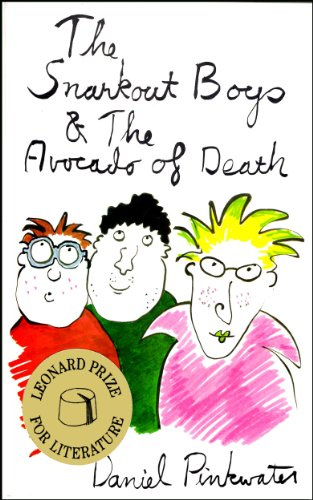The Snarkout Boys and the Avocado of Death vs. the rest of literature
Imagine a scene from a classic of children’s literature. Does it involve the snap of biting into a bright red hot dog with a chemical taste? Or maybe it includes a man and his singing chicken performing in a hinterland bar? Or perhaps a pair of teen boys being physically knocked against a wall in a soundproofed basement by the decidedly-not-stereo system of a girl with green hair nicknamed Rat (but with the actual name of Bentley Saunders Harrison Matthews)?
If not, why not?
The cognoscenti among you will recognize all those scenes from the book The Snarkout Boys and the Avocado of Death, by Daniel Pinkwater. Everyone’s favorite Pinkwater book is bound to be different. Some people favor Lizard Music, the first appearance of that man with the chicken. Others think that Alan Mendelsohn, the Boy from Mars and its exploration of “lost continents” and the weak-tasting drink fleegix is the height of his powers. Yet others may dream at night of the plot of Fat Men from Space.
For me, Pinkwater’s greatest is that first Snarkout Boys book. In general, however, I’m a fan of them all.
Whimsy is a common element in children’s literature. It pops up from Wonderland to Oz. But true bizarreness may be less common. Pinkwater has written some masterful bizarreness in his kids’ books.
But what is an entertaining addendum to much of that bizarreness is that lots of it is drawn from real life.

Art imitates life
Sometimes you find out new things by googling them. Sometimes you find them out through serendipity. What I learned about Pinkwater was due to serendipidity.
One day during the height of the pandemic, I was looking for books to buy, and I found a book by Pinkwater entitled Fish Whistle. It was a written collection of non-fiction essays that he would read on public radio for a period back, well, whenever that happened. Curious, I bought it.
Over a few weeks, one of my kids and I meandered through quite a number of the essays in the book. Most of them are short vignettes from Pinkwater’s life. And what we noticed was that many of those vignettes echo scenes in his fictional stories.
Now, remember, Pinkwater is the kind of author in whose books there may be—spoiler alert—a World War II submarine in Lake Ontario or a giant chicken in Hoboken. These books have plenty of elements that are nonsense. But it turns out that, for example, the red hot dogs that snap and have a chemical taste and the man with the chicken aren’t nonsense. In fact, they’re drawn from real life. So are many, many other elements of Pinkwater’s stories.
This was weird, in the way that a Pinkwater story is weird. But it appears that real life is weird.

The moral of the story is…
Daniel Pinkwater’s books are often about the way that loners and outcasts find friendship with one another (and go on to have weird adventures in strange places).
The Snarkout Boys and the Avocado of Death is also about that. But one of the elements that always drew me to that book is the fact that it explores liminal spaces so deeply. The term liminal spaces refers to spaces that exist between two other major spaces, a threshold space. (Liminal comes from the Latin word for doorway.)
In the book, the main characters spend a lot of time in the dead zones of modern cities, in the weird spaces under underpasses and outside diners and so forth. They get to go to great places, but they also have to trudge through weird spaces to get there. There is the feeling that you get—or at least I get—that Pinkwater noticed the spaces in cities that aren’t noticed and pulled them into his novel.
Pinkwater’s books are full of whimsy. They’re about any number of weird things. But they are also drawn from real life, and they contain fascinating artifacts that the author pulled out of the real world and brought into a world that definitely isn’t our world but isn’t entirely separate.


